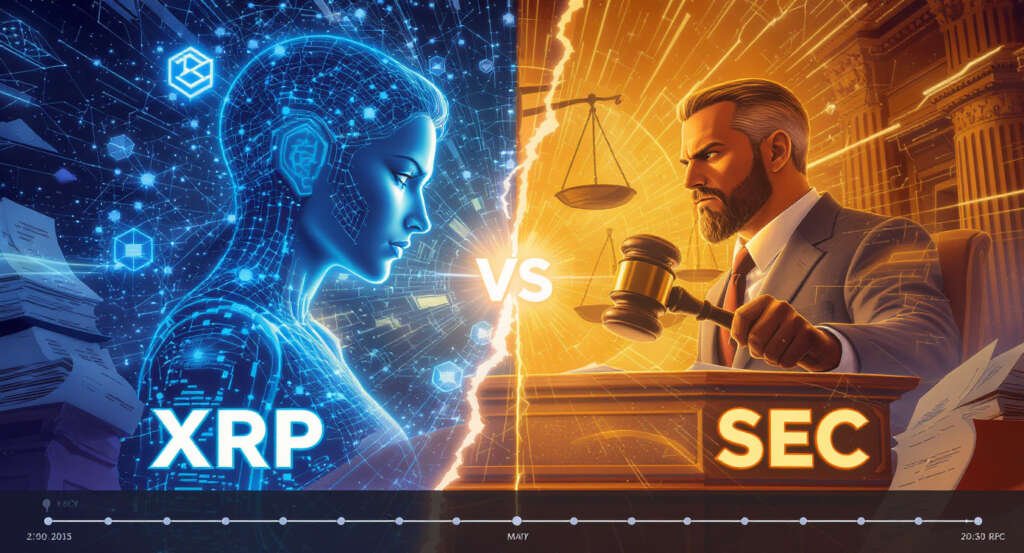The cryptocurrency space has had many legal and regulatory challenges, but none have been as substantial or closely watched as Ripple’s XRP vs SEC lawsuit. Since the lawsuit was filed in December 2020, it has become the world’s centre stage for all ongoing discussions about digital asset regulation, investor protection, and deference by U.S. regulators to their established jurisdiction.
The Securities Exchange Commission asserted that Ripple Labs unlawfully sold over $1.3 billion of XRP as an unregistered security, which is a violation of U.S. securities law. Ripple, on the other hand, argued that XRP is a utility token to facilitate cross-border payments and liquidity solutions and not an investment contract.
Why does it matter? Because it has ramifications far beyond Ripple. The outcome of the case would likely influence how the SEC treats other large tokens deemed to be securities by the SEC, how crypto exchanges choose to list or delist assets on their platforms, and even how investors interact with blockchain projects in the U.S. and across the globe
Ripple is an important player in the blockchain ecosystem. Its mission is to enhance cross-border payments in terms of speed, cost, and efficiency using blockchain technology. XRP is the native token of Ripple and is used as a bridge currency in Ripple’s On-Demand Liquidity (ODL) services. If XRP is deemed a security, it could significantly impair and diminish the utility of XRP and Ripple’s business globally.
Background: What Brought About the Lawsuit?
Ripple’s Creation and Initial Development
Ripple was established in 2012 with the goal of bringing change to cross-border payments by utilizing blockchain technology. Ripple had a different focus compared to Bitcoin. While the latter was devised as an alternative to fiat currency, Ripple was not trying to reinvent money. Rather, its goal was to help banks and financial institutions settle transactions faster. XRP was intended as a means to facilitating liquidity.
Timeline of Events That Led Up to the SEC Filing
2012–2013: Ripple builds and develops the XRP Ledger. Ripple provides legal memos that recognize potential legal issues, although they generally suggest XRP would not be considered a security if marketed in the proper manner.
2015: Ripple settles with FinCEN regarding various AML violations, in which regulators classify XRP as a “convertible virtual currency”.
2017–2019: The ICO boom brings SEC enforcement actions against projects such as Telegram and Kik. This causes an increase in scrutiny of token sales.
2020: Ripple undergoes major partnerships (e.g., Santander, MoneyGram) and continues expansion efforts internationally.
December 2020: The SEC files against Ripple, Brad Garlinghouse and Chris Larsen.
SEC’s Principal Claim
The SEC claims Ripple has been running an ongoing, unregistered securities offering. According to the SEC, XRP fulfils the criteria of the Howey Test, and therefore is an “investment contract”.
Ripple’s Defense
Ripple contends that XRP, like Bitcoin and Ethereum, is a form of digital currency that has real utility. It contends that:
- XRP is traded on exchanges across the globe and is therefore decentralized and out of Ripple’s control.
- The SEC violated due process by failing to provide fair notice.
- FinCEN and prior investigations recognized XRP as a currency.
Market Response
After the lawsuit was filed, the following transpired:
- XRP’s price dropped from slightly under $0.60 to below $0.20.
- U.S. exchanges (Coinbase, Kraken, Binance.US) delisted XRP.
- Ripple lost partnerships in the U.S. but gained traction internationally.
Important Legal Issues in the XRP vs SEC Case
1. The Definition of a Security – The Howey Test
The SEC’s standard for determining if something is a security is called the Howey Test:
- Investment of money
- In a common enterprise
- Expectation of profits
- From the efforts of others
Ultimately, the SEC took the position that XRP purchasers acquired XRP in hopes of making a profit, linking their expectations to profit off Ripple’s efforts, while Ripple asserts that XRP’s primary purpose is to be a utility for payments and was never intended to generate a passive profit.
2. Centralization versus Decentralization
The SEC asserted that Ripple controlled XRP’s supply, which at one point held 50% of the supply, satisfying the common enterprise and investment aspect of the case, suggesting it was centralized. Whereas Ripple argued that XRP Ledger has decentralized global validators and acts independently of Ripple Labs.
3. Fair Notice Defense
Ripple claimed it lacked “fair notice” when there was a possibility XRP would be classified as a security, especially given other regulators, such as FinCEN classified XRP as a virtual currency. Courts have routinely grappled with similar defenses, making this a high-stakes battle.
Major Judicial Developments and Decisions
In this case, significant rulings have transpired:
2021-2022: There were fights over discovery on Ripple’s requests for internal SEC documents, including drafts of former SEC Director William Hinman’s 2018 speech indicating Ethereum is not a security.
In July 2023, Judge Analisa Torres ruled:
Institutional sales of XRP = securities.
Programmatic (exchange) sales of XRP = not securities.
After the ruling, XRP traded as high as approximately 70%, with some exchanges like Coinbase relisting XRP.
SEC Appeal Denied: In October 2023, the court denied the SEC’s interlocutory appeal, further confirming Ripple’s partial win.
Settlement Speculation: Ongoing, but confirmed nothing has been settled.
Effect of the Lawsuit on Ripple and XRP
XRP Price Volatility
The lawsuit created extreme volatility in XRP’s price, making XRP the most legally sensitive asset in crypto.
Exchange Delisting
XRP was delisted from nearly every U.S. platform; however, many platforms recently offered XRP again after the 2023 ruling. International exchanges largely continued to support XRP.
Ripple’s Business
Ripple is doubling down abroad, focusing on expansion in the UAE, Singapore, and Europe. Ripple secured several agreements with new banking and remittance partners, despite the hurdles of U.S. regulatory oversight.
Long-Term Outlook
Ripple’s prospects in the U.S. remain unknown, but the lawsuit has given Ripple a global mantle of exemplifying a firm standing up to regulators with an unclear or inconsistent position.
Implications for the Crypto Space
The XRP vs SEC lawsuit is not just a lawsuit related to one token; it is an inflection point for the crypto industry. There will be implications and interpretations beyond exchanges, token issuers, DeFi projects, and even foreign regulators. By analysing the precedent the case sets, the SEC’s broader enforcement policy, and how it affects exchanges and their own litigation, we can better understand why the industry is so invested in this case.
Precedent for the Other Tokens
Possibly the first implication of Judge Torres’ ruling is how it may apply to other tokens. The court makes a distinction between institutional sales (which were deemed securities) and sales on exchanges in the secondary market (which were not), which adds some clarity. For tokens like Solana (SOL), Cardano (ADA), and Polygon (MATIC), which have all faced questions regarding their legal status, this is the perfect ruling for Ripple. If sales that occur in the secondary market are not securities transactions, then millions of retail transactions could dodge SEC penalties. This interpretation could spare investors, exchanges, and token issuers from ex-post-facto enforcement.
Nonetheless, institutional sales, venture capital agreements, or direct distributions of tokens may still become subject to scrutiny because of the U.S. securities laws. For these reasons, the XRP case established a two-pronged precedent wherein tokens may potentially act as utilities in public markets while also acting as securities in private financing agreements. Accordingly, the ruling creates a degree of legal ambiguity that other tokens will need to carefully assess.
The SEC’s Enforcement Policy
The lawsuit also sheds light on the larger role of the SEC’s enforcement policy, sometimes referred to as “regulation by enforcement.” The SEC has not provided clear regulations for the industry, opting instead to enforce litigation against companies to establish a guideline for acceptable behaviour.
This policy of “regulation by enforcement” has received substantial criticism:
- Uncertainty for Innovators: Startups and issuers of tokens tend to hesitate when launching in the United States because they do not know if their tokens may later qualify as securities.
- Government Overreach: Some policymakers and industry leaders believe that the SEC is stepping outside of their obligations and stretching the definition of securities beyond its original constructs.
- Regulatory Smothering of Innovation: By creating fear of litigation, companies are driven to create innovation overseas to jurisdictions such as the EU, UAE and Singapore, where the rules are clearer.
Ripple’s defense of fair notice highlighted this issue of uncertainty when there is a consistent lack of regulatory party guidelines.
Exchanges and DeFi
The SEC-XRP decision directly affects crypto exchanges and decentralized finance (DeFi) platforms.
For exchanges, there is still a considerable risk of listing tokens classified as securities. Hence, Coinbase and its peers removed XRP as quickly as they had listed it in 2020 and then were reluctant to list it again until the favourable ruling in 2023. Now every listing has legal consequences, and exchanges are spending considerable resources on compliance teams and legal reviews of potential listings.
There are even fewer protections for decentralized finance (DeFi), where decentralized exchanges (DEXs) do not have centralized intermediaries to even take responsibility for listings – a DEX could facilitate a trade in XRP or a token with characteristics regulators would classify as a security, with or without notice. The restrictions presented by these encumbering regulations dampen economic activity in one of the most innovative and vibrant sectors of the crypto ecosystem. The big picture is clear. Unless there are clear laws and regulations, exchanges and DeFi protocols will always function under uncertainty that balances the quest for innovation with the chance of regulatory repercussions.
Current Lawsuits
The Ripple case hasn’t unfolded in a vacuum. It is happening in tandem with other prominent enforcement actions by the SEC that reflect a larger struggle over the scope of its jurisdiction.
Coinbase: The SEC is accusing Coinbase of operating an unregistered securities exchange via the sale of several of its listed tokens. Coinbase has stated that it attempted to get a clearer understanding from regulators, but that it received no clarity.
Binance: The SEC has asserted purported securities violations, mismanagement of customer funds, and improper disclosures and sent a message that it intends to impose its authority over global crypto exchanges.
Kraken: The SEC fined Kraken for its staking services. The SEC is still putting Kraken through the wringer concerning how staking products should be classified.
All of these cases demonstrate a thoughtful effort by the SEC to impose its authority over most crypto assets. The Ripple decision and the distinction between institutional and retail sales will surely be cited in these cases. If the Ripple decision is upheld, it will undermine the SEC’s argument that “Most tokens are securities.”
The Larger Implications
At a higher level, the XRP v. SEC legal case has pushed the industry, regulators and courts to address more openly the nebulous grey area of crypto regulation. It may bring about a change in:
- Future U.S. legislation that can further delineate the roles of the SEC, CFTC and other agencies.
- Harmonization across jurisdictions as other jurisdictions consider Ripple’s outcome when developing their own frameworks.’
- Investor protection, achieving a balance between encouraging innovation while deterring fraud and abuse.
Ripple’s litigation is about much more than the survival of a company; it is the infrastructure for the new landscape of global crypto governance for the next decade.
International Highlights
In the meantime, other jurisdictions have established clearer frameworks than Ripple can find in the U.S:
EU (MiCA): Creates guidelines for token issuers, stablecoins, and crypto service providers.
UAE: The Virtual Assets Regulatory Authority (VARA) has established a proactive, structured licensing framework that has attracted Ripple and others to set up in the UAE.
UK: The Financial Conduct Authority, FCA, adopts a balanced approach working towards consumer protection while still not classifying tokens as securities.
Asia-Pacific: Singapore and Japan have publicly embraced Ripple, specifically viewing XRP as a payment token.
What Next?
Future scenarios for XRP and Ripple May include:
Final judgment or settlement: Ripple could agree to a settlement with the SEC, perhaps owing some fine, but clearing the air for the constitutionality of how XRP is defined.
Appeals: Either party can appeal judgments not settled through agreement, delaying any enforcement action.
Ripple IPO: Brad Garlinghouse hinted that Ripple would be working towards a public listing to provide liquidity for some stakeholders. This could make Ripple one of the first crypto-native companies to IPO.
U.S. Regulatory Reform: Congress may be compelled to produce a comprehensive bill addressing some type of regulation of cryptocurrencies and possibly defining the SEC’s role at a high level.
Investor confidence: A positive and final ruling may restore investor confidence, which could push XRP back into the top tier by volume and adoption.
Community and Investor Response
The XRP Army — a rabid online community, has driven the conversation and narrative surrounding the public discussion of the lawsuit.
- Retail Investors: Passionate and vocal, largely seeing Ripple as fighting for freedom of crypto.
- Institutional Investors: More careful and taking a wait-and-see approach with their money until standardization regulations indicate a more acceptable level of risk.
- Social Media: Movements like “Relist XRP” trended globally, indicating the strength and magnitude of the community.
- Liquidity: While surges in retail trading volume followed the rulings, institutional liquidity remained evidently restrained.
The XRP vs SEC fight is more than a lawsuit. This is a moment for crypto regulation in the U.S. and across the globe. The outcome of this case will determine how tokens will be categorized, how exchanges operate, and how regulators view any potential for digital innovation.
Ripple’s battle showcases the relevance and necessity of regulatory clarity, not only for XRP but for the crypto industry as a whole. No matter the final outcome of the verdict, this case will set a precedent in determining the legal foundation of blockchain products and cryptocurrencies.
FAQs
1. What is the SEC’s main argument against XRP?
A: The SEC claims Ripple sold XRP in a transaction that totalled more than $1.3 billion as unregistered securities.
2. Is XRP a security today?
A: Judge Torres ruled that XRP is not a security when it is sold to any consumers on exchanges, although it can still be considered a security in the case of institutional sales.
3. Did Ripple win the lawsuit against the SEC?
Ripple won a partial victory in 2023, but there are still parts of the case that are unresolved.
4. How did the lawsuit affect XRP’s price?
A: The lawsuit resulted in not only steep price drops but also rallies after the favourable rulings came down.
5. What does the Ripple case mean for all other cryptocurrencies?
A: It will set a precedent; many tokens will be avoided as a security when sold through the secondary market, although the issuers are still at risk.




